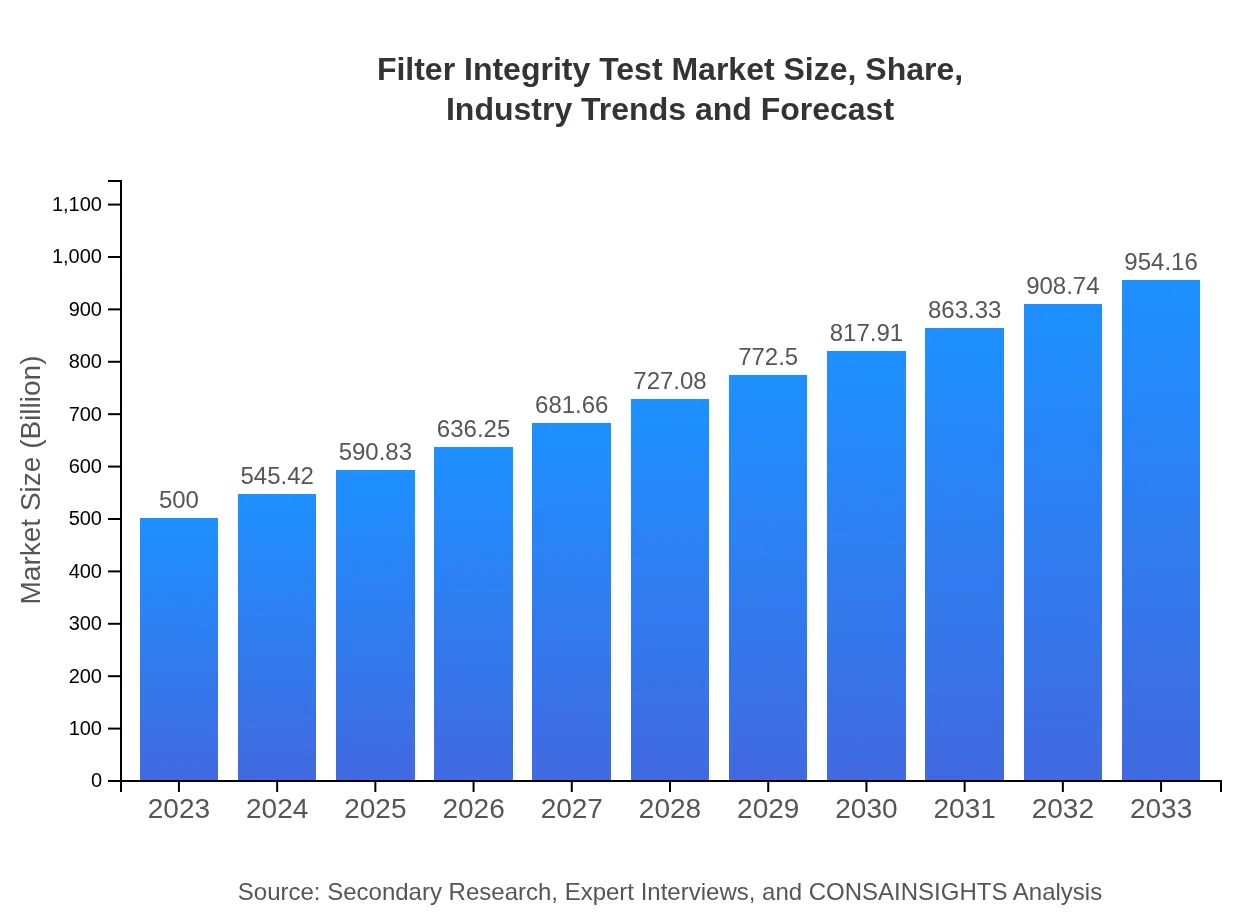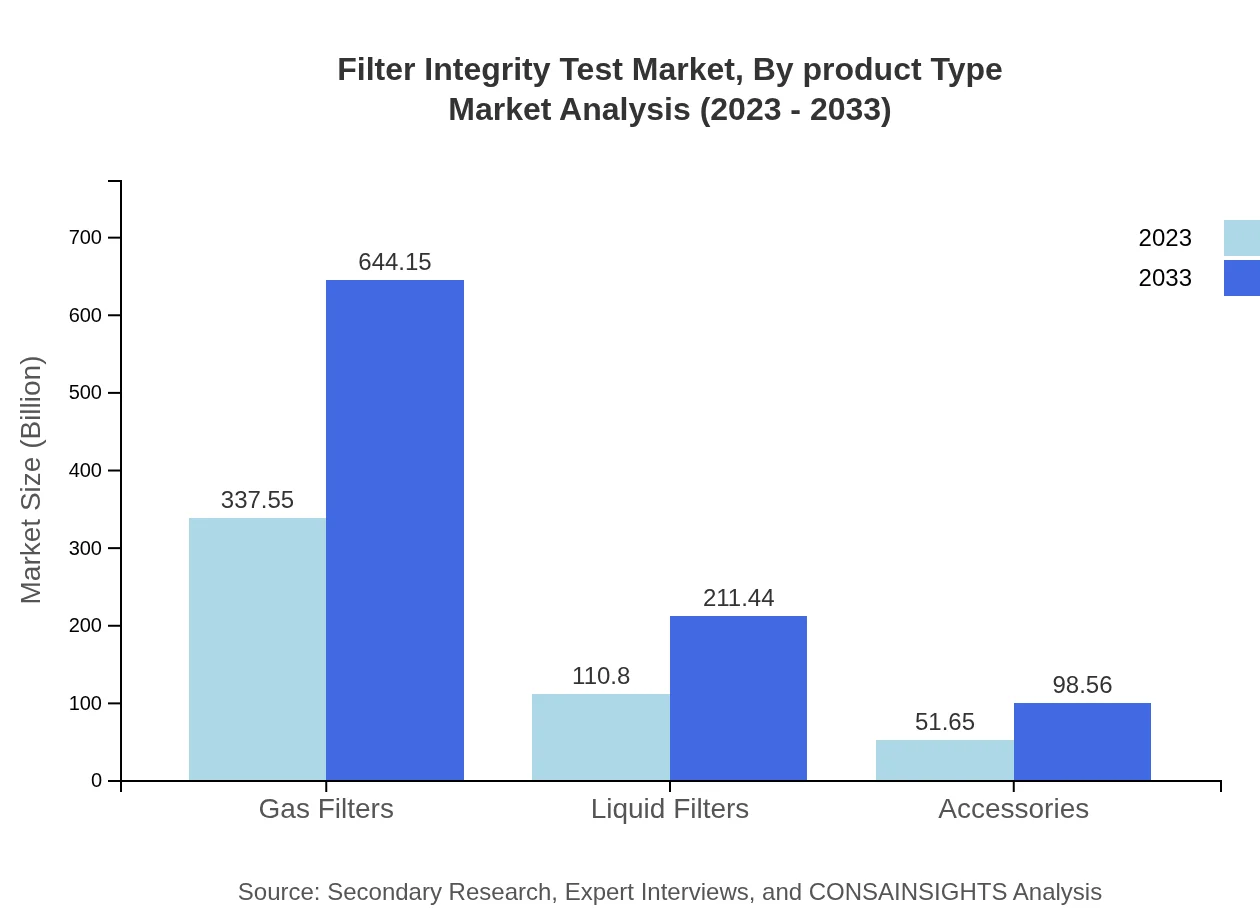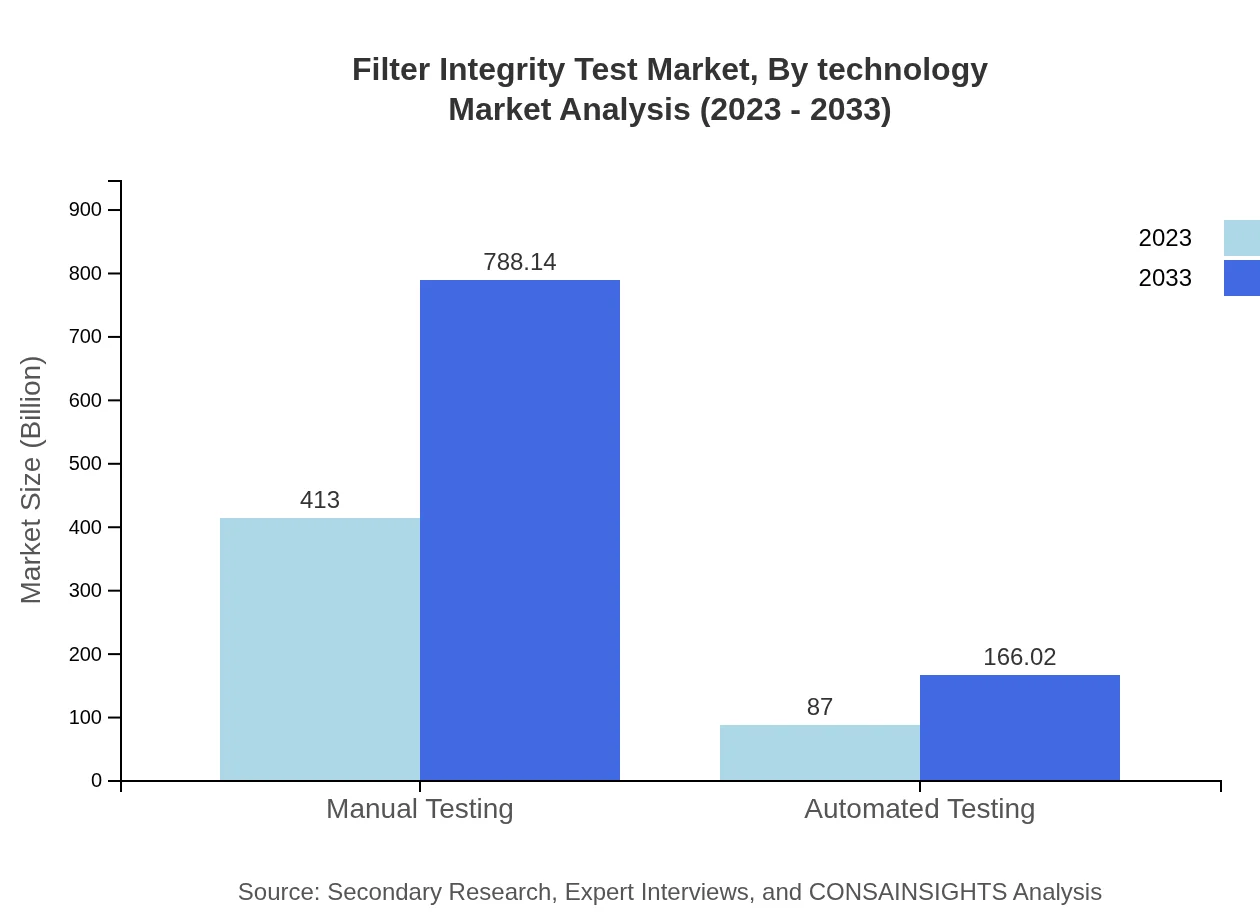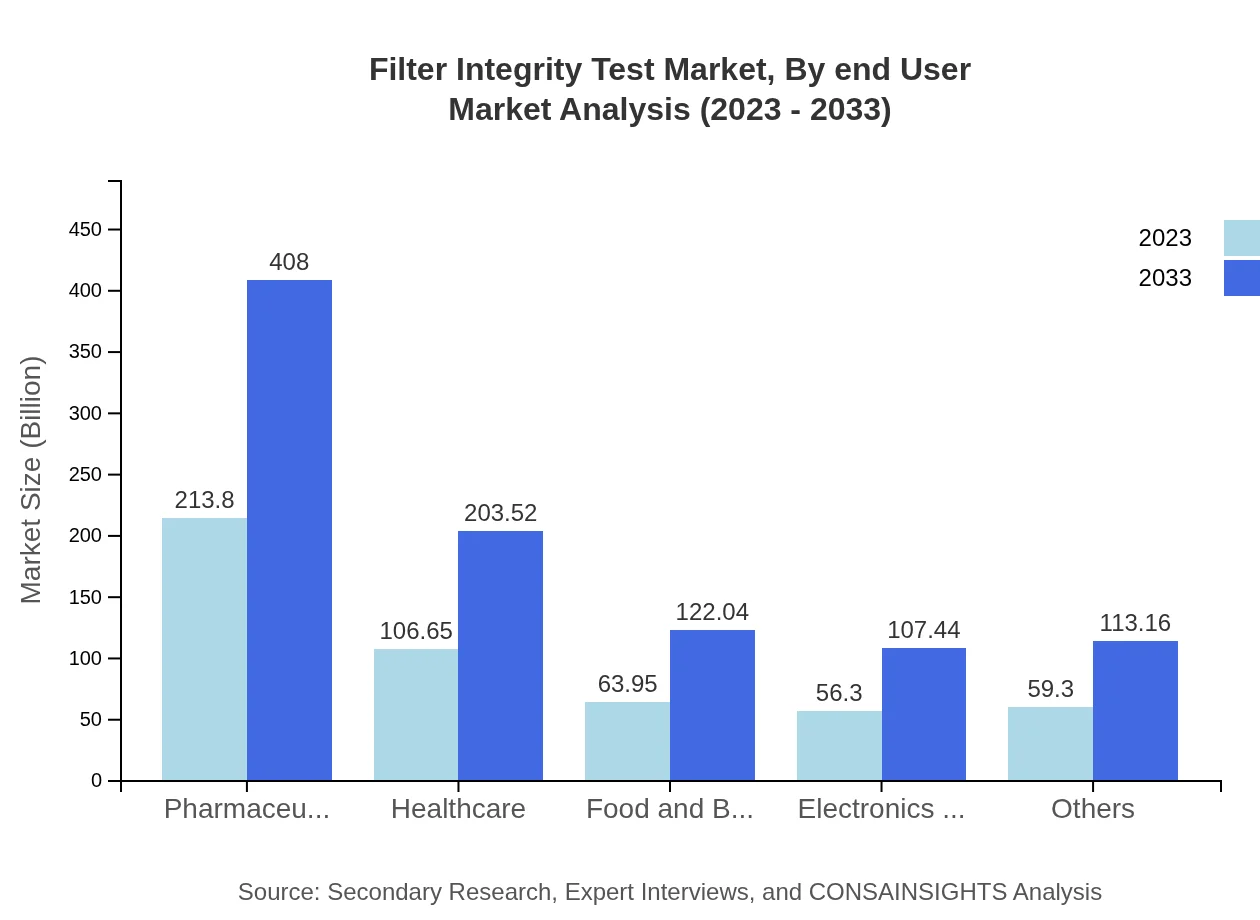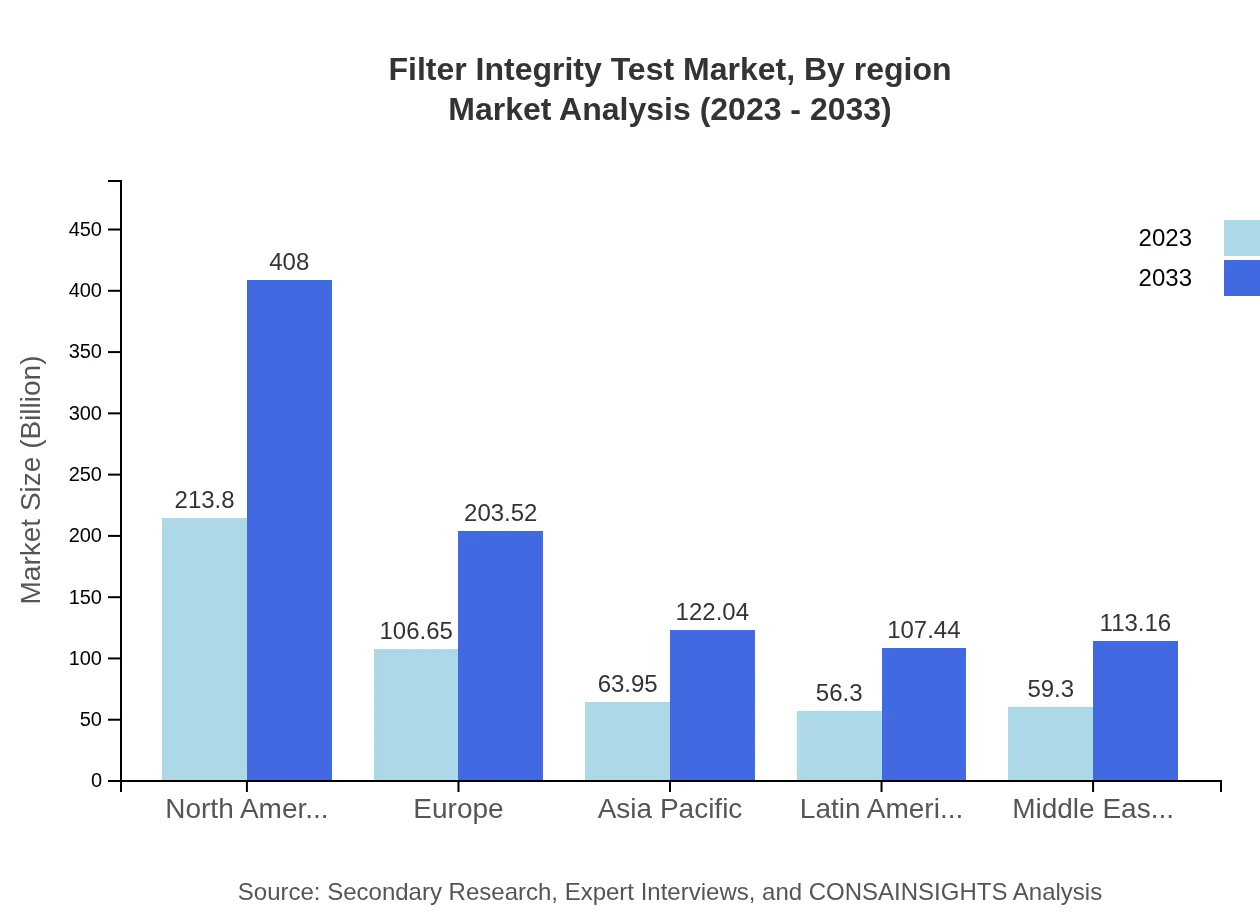Filter Integrity Test Market Report
Published Date: 31 January 2026 | Report Code: filter-integrity-test
Filter Integrity Test Market Size, Share, Industry Trends and Forecast to 2033
This report provides a comprehensive analysis of the Filter Integrity Test market, offering insights into market size, growth trends, segmentation, and regional dynamics from 2023 to 2033. It serves as a valuable resource for stakeholders seeking to understand the industry's landscape and future opportunities.
| Metric | Value |
|---|---|
| Study Period | 2023 - 2033 |
| 2023 Market Size | $500.00 Million |
| CAGR (2023-2033) | 6.5% |
| 2033 Market Size | $954.16 Million |
| Top Companies | Parker Hannifin Corporation, Sartorius AG, Merck KGaA, GE Healthcare, Eaton Corporation |
| Last Modified Date | 31 January 2026 |
Filter Integrity Test Market Overview
Customize Filter Integrity Test Market Report market research report
- ✔ Get in-depth analysis of Filter Integrity Test market size, growth, and forecasts.
- ✔ Understand Filter Integrity Test's regional dynamics and industry-specific trends.
- ✔ Identify potential applications, end-user demand, and growth segments in Filter Integrity Test
What is the Market Size & CAGR of Filter Integrity Test market in 2023 and 2033?
Filter Integrity Test Industry Analysis
Filter Integrity Test Market Segmentation and Scope
Tell us your focus area and get a customized research report.
Filter Integrity Test Market Analysis Report by Region
Europe Filter Integrity Test Market Report:
Europe's market is set to increase from $148.40 million in 2023 to $283.19 million by 2033. The stringent regulations governing pharmaceutical and healthcare sectors within Europe create high demand for effective filter integrity testing. Innovation and advancements in filtration technologies also play a key role in this market's growth.Asia Pacific Filter Integrity Test Market Report:
In the Asia-Pacific region, the Filter Integrity Test market is anticipated to grow from approximately $95.05 million in 2023 to $181.39 million by 2033. The growth is propelled by increasing industrialization, rising healthcare needs, and stringent regulations that require rigorous quality assurance processes. Countries like China and India are witnessing significant investments in healthcare and pharmaceutical sectors, further driving market growth.North America Filter Integrity Test Market Report:
The North American market remains one of the largest, projected to grow from $181.15 million in 2023 to $345.69 million by 2033. The region's strong regulatory frameworks, particularly in pharmaceuticals and food safety, drive compliance-driven demand for filter integrity testing. Technological advancements and a focus on quality control in manufacturing further enhance market prospects.South America Filter Integrity Test Market Report:
The South American market is expected to expand from $16.40 million in 2023 to $31.30 million by 2033. Factors such as increasing awareness regarding product safety and the growth of the pharmaceutical industry are expected to drive demand for filter integrity testing. While challenges remain, the region’s economic growth prospects provide a promising outlook for expansion.Middle East & Africa Filter Integrity Test Market Report:
In the Middle East and Africa, the Filter Integrity Test market is projected to grow from $59.00 million in 2023 to $112.59 million by 2033. Factors such as advancements in healthcare infrastructure and rising investments in pharmaceutical manufacturing are expected to enhance the market landscape. However, the region still faces challenges related to regulatory complexities and market accessibility.Tell us your focus area and get a customized research report.
Filter Integrity Test Market Analysis By Product Type
The primary segments within the Filter Integrity Test market include gas filters, liquid filters, and various accessories. Gas filters constitute a significant share, with a market size of approximately $337.55 million in 2023, projected to grow to $644.15 million by 2033. Liquid filters follow closely, starting at $110.80 million and expected to reach $211.44 million. Accessories, while smaller, show promising growth, increasing from $51.65 million to $98.56 million over the same period.
Filter Integrity Test Market Analysis By Technology
The technologies used in filter integrity testing can be broadly classified into manual and automated testing. Manual testing, leading with a market size of $413.00 million in 2023 and anticipated to reach $788.14 million by 2033, still dominates due to its comprehensive approach. However, automated testing is gaining traction, projected to grow from $87.00 million to $166.02 million, offering efficiency and consistently more accurate results.
Filter Integrity Test Market Analysis By End User
Pharmaceuticals occupy the largest share, contributing $213.80 million in 2023 and expected to grow to $408.00 million by 2033. Healthcare is also significant, with its market size projected to increase from $106.65 million to $203.52 million. The food and beverage segment starts at $63.95 million and grows to $122.04 million, while electronics manufacturing contributes $56.30 million and is projected to grow to $107.44 million.
Filter Integrity Test Market Analysis By Region
Regional dynamics play a crucial role in the Filter Integrity Test market. North America accounts for 42.76% of the market share in 2023, expected to remain consistent in 2033. Europe follows at 21.33%, also projected to maintain its share, while Asia-Pacific, Latin America, and the Middle East and Africa hold shares of 12.79%, 11.26%, and 11.86% respectively in both years.
Filter Integrity Test Market Trends and Future Forecast
Tell us your focus area and get a customized research report.
Global Market Leaders and Top Companies in Filter Integrity Test Industry
Parker Hannifin Corporation:
A leading manufacturer of filtration and separation technology, Parker Hannifin offers a variety of filter integrity testing solutions and has a strong presence in pharmaceuticals and manufacturing sectors.Sartorius AG:
Sartorius is known for its accuracy and reliability in the biotech and pharmaceutical industries, providing essential filter integrity testing products that enhance operational efficiency.Merck KGaA:
Merck is a major player in the life sciences sector, providing innovative filtration solutions and testing methodologies that ensure compliance with industry standards.GE Healthcare:
GE Healthcare focuses on healthcare technologies and has a diverse portfolio that includes filter integrity testing equipment crucial for the healthcare sector.Eaton Corporation:
Eaton offers filtration and contamination control solutions with a focus on improving efficiency and safety in various industries, including pharmaceuticals and food and beverage.We're grateful to work with incredible clients.









FAQs
What is the market size of filter Integrity Test?
The global filter integrity test market is valued at approximately $500 million in 2023, with a projected CAGR of 6.5%, leading to significant growth by 2033.
What are the key market players or companies in this filter Integrity Test industry?
Key players in the filter integrity test market include leading companies in pharmaceuticals, healthcare, and food and beverage sectors. These organizations invest in innovative testing technologies contributing to market growth.
What are the primary factors driving the growth in the filter integrity test industry?
Growth in the filter integrity test industry is driven by increasing safety regulations, rising demand for quality assurance, and advancements in testing technologies across pharmaceuticals and food sectors.
Which region is the fastest Growing in the filter integrity test?
The fastest-growing region for the filter integrity test market includes North America, projected to grow from $181.15 million in 2023 to $345.69 million by 2033.
Does ConsaInsights provide customized market report data for the filter integrity test industry?
Yes, ConsaInsights offers customized market report data tailored to specific needs in the filter integrity test industry, ensuring relevant insights and data for your requirements.
What deliverables can I expect from this filter Integrity Test market research project?
Deliverables include detailed market analysis, growth forecasts, competitive landscape insights, regional breakdowns, and tailored recommendations for strategic planning in the filter integrity test sector.
What are the market trends of filter integrity test?
Emerging trends in the filter integrity test market focus on automation, increased regulatory compliance, and advancements in digital technologies that enhance testing efficiency and accuracy.

